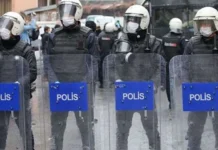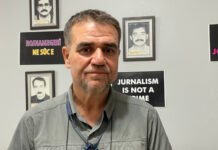Sixty-eight nongovernmental organizations have issued a joint statement urging the immediate release of jailed Kurdish politician Aysel Tuğluk, who according to her lawyer suffers from dementia, Turkish Minute reported on Tuesday, citing the Mezopotamya news agency.
“We demand the release of Aysel Tuğluk. … We also reiterate our demand for all women imprisoned for politically motivated reasons to regain their freedom,” the organizations said.
“Administrative and judicial authorities who ignore the report [saying that] she ‘cannot stay in prison’ will be responsible for any unfavorable consequences that may develop regarding Tuğluk’s health,” the NGOs added.
They were referring to a report issued by a medical board comprising nine physicians at Kocaeli University Hospital stating that Tuğluk, a former deputy co-chair of the Peoples’ Democratic Party (HDP), could not survive on her own.
Turkey’s Council of Forensic Medicine (ATK), an institution affiliated with the Ministry of Justice whose independence and credibility have been called into question lately due to an increasing number of deaths of critically ill inmates with ATK reports, saying they are “fit to remain in prison,” denied Tuğluk ‘s release after a brief examination, despite the medical board report, according to local media reports.
Tuğluk was arrested on Dec. 29, 2016, while she was deputy co-chair of the HDP along with seven other Kurdish opposition politicians. She was sentenced to 10 years in prison on charges of serving as an executive of a terrorist organization and taking orders from Abdullah Öcalan, the jailed leader of the outlawed Kurdistan Workers’ Party (PKK), an armed group listed as a terrorist organization by Turkey, the European Union and the US.
Tuğluk has denied the accusations, saying she never called for violence and always sought democratic solutions to problems the Kurds faced.
Human rights activists and opposition politicians have frequently criticized authorities for not releasing critically ill prisoners so they can seek proper treatment. Human rights defender and HDP deputy Ömer Faruk Gergerlioğlu said ill prisoners were not released until they were at the point of no return.
According to Gergerlioğlu, sick prisoners are released when the authorities realize they will die soon. He claimed that prisoners did not have access to proper healthcare facilities such as hospitals or infirmaries.
HPD deputy Züleyha Gülüm said political prisoners were the most disadvantaged and were often the least likely to be released in the event of a serious health problem.















